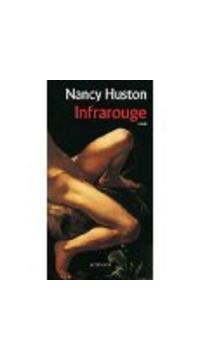
" Infrarouge "
Novel
Actes Sud
- Nominated for : The Literary Prize 2011
Born in 1953, Nancy Huston is a Franco-Canadian writer, English and French speaking. After university studies in the United States, she moved to Paris in the 1970's to work on a thesis on swear words at the School of Advanced Studies in Social Sciences under the direction of Roland Barthes, participating at the same time in the women's liberation movement.
Nancy Huston is also a musician and has signed two films scenarios, Voleur de vie (1998) and Emporte-moi (1999), and plays Angela and Marina (2002) and Queen Jocasta (2009).
the career of novelist Nancy Huston began in 1981 with Les variations Goldberg written directly in French and continued in 1985 with Histoire d'Omaya : "agmentaire, kaleidoscopic and burning, this text is trying to say the unsayable: the humiliation, the pain of a scorned woman." (Introduction by the editor)
In 1989, with Trois fois séptembre, she returned to a major episode in American history, the Vietnam War, which serves as the backdrop for an analysis of changes in society and the youth of the time.
Since Cantique des plaines (1993 - Governor General's Award and Prize Canada-Switzerland), Nancy Huston employs a technique of double writing in French and English for all her novels, using only French for her essays, amongst which we can cite Journal de la création(1990), Tombeau de Romain Gary (1995), Limbes / Limbo (2000), L'espèce fabulatrice (2008) and Nord Perdu(1999), autobiographical narrative in which she tells how her father was awarded custody of the children and her future mother in law took her for a few months to Germany.
La Virevolte (1994 - Prix Louis Hemon) is like "One, two, three little turns and then goes: Lin has a husband, two daughters, friendships, moments of rare happiness. But inevitably, a passion that is also her job - dancing - imposes in her life. Until she chooses... La Virevolte, that's it: an irresistible impulse, an impulse, a burst that, from delivery to abandon and sending remain forever a burst towards life. Dancing, the mysterious work of time, dizziness and confusion of being a mother, the unspeakable loneliness, beauty and vulnerability of the body, power cycles, the enigmatic fate of the family imprint: in this book that never judges there is an overwhelming force of understanding." (Introduction by the editor)
Instruments des ténèbres (1996 - Prix Goncourt for students and Book Prize Inter) tells "the cross destinies (with three centuries apart) of two heroines. One of them is a farm servant raped by her master and accused of witchcraft at the time of Louis XIV. The other is a novelist, liberated young woman, who lives in 1996. The two young women find one another in the mirror of their suffering and their wanderings." (Introduction by the editor)
Published in 1998, L'Empreinte de l'ange (Grand Prix of readers Elle) "is a dark novel, a disturbing novel that grabs us and pursues us. It is a story of love and war, adultery and infanticide." (Pascale Frey, Reading, 1 June 1998)
Released in 1999, "Prodige is the story of this little girl, Maya, pianist. But it is also that of her parents, who are seeking themselves, love each other and, separate, that of a Russian grandmother and an attentive neighbor, that of Bach's music, challenging and joyful. Polyphonic poignant tale explores the boundaries between dream and madness, love and pain, art and reality." (Introduction by the editor)
In Dolce agonia (2001 - Odyssey Award), "gathered around a Thanksgiving meal, twelve guests talk about birth, death, dizzy thoughts and the waltz of sentiments... while the reader is instructed by God himself, the destiny to which without knowing these characters are moving." (Introduction by the editor)
In 2003, in Une adoration "In court players appear to solve the death of the famous comedian Cosmo, the characters knew him. A love story that reveals the senseless violence of the ordinary)." (Introduction by the editor)
Ligne de faille (2006 - Prix Femina Prize and France Televisions) associates "into abyss and multiple points of view: Nancy Huston has made a specialty of inventive narration, renewing with every book her own style." (Sabine Audrerie, Le Figaro, 26 August 2006)
With Infrarouge (Actes Sud, May 2010), "Nancy Huston is at the best of her talent in individual and collective reminiscense. She knows how to make family destinies live..She proves to be combative in the denunciation of power relations between individuals and the dominant classes, in tracking hypocritical behaviour." (Rene de Ceccatty, Le Monde, May 14, 2010)

